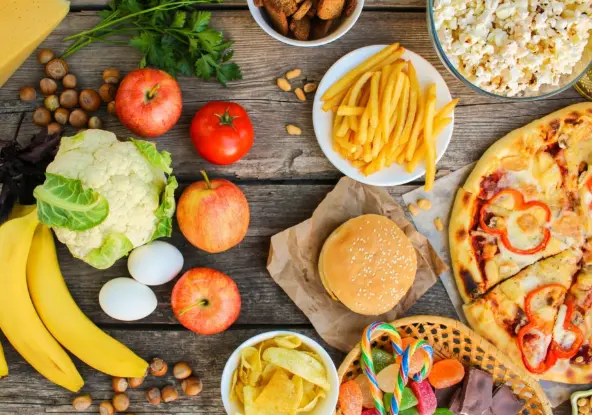Don’t Stress Eat Your Way Through It: Healthy Eating Habits for Busy and Stressed Times
Life throws curveballs, and sometimes those curveballs come in the form of chronic stress. When deadlines loom, anxieties rise, and the pressure mounts, our relationship with food can take a backseat. We might reach for sugary snacks for a quick comfort boost or skip meals altogether due to a lack of appetite. But here’s the thing: what we eat significantly impacts how we handle stress. So, how do you make healthy choices when stress is calling the shots? This blog post will equip you with essential strategies for mindful eating during challenging times.
The Stress & Food Connection: Why We Crave Comfort During Stress
When we’re stressed, our body releases the hormone cortisol, which can trigger cravings for sugary, fatty, and processed foods. These foods provide a temporary surge of pleasure, but the health consequences can be significant. Here’s why understanding this connection is crucial:
-
Stress and Blood Sugar: Cortisol can cause blood sugar spikes and crashes, leading to energy dips and increased cravings for sugary treats.
-
Stress and Emotional Eating: We may turn to food for emotional comfort, using it to cope with negative feelings instead of addressing the root cause of stress.
-
Stress and Mindful Eating: Stress can cloud our judgment and make us less mindful of our eating habits. Mindless eating often leads to overconsumption.
Breaking the Cycle: Strategies for Healthy Eating During Stress
So, how do we resist the urge to raid the pantry when stress hits? Here are some practical tips to help you make healthy choices:
-
Plan Your Meals: Having healthy snacks and meals prepped in advance reduces the temptation to grab unhealthy options when stressed.
-
Prioritize Protein and Complex Carbs: Include lean protein sources (chicken, fish, beans) and complex carbohydrates (whole grains, vegetables) in your meals to keep you feeling full and energized.
-
Don’t Skip Meals: Skipping meals can lead to overeating later. Aim for regular meals and healthy snacks throughout the day to maintain stable blood sugar levels.
-
Hydrate, Hydrate, Hydrate!: Dehydration can sometimes mimic hunger pangs. Drinking plenty of water helps you feel full and reduces cravings.
-
Practice Mindful Eating: Slow down, savor your food, and pay attention to your body’s hunger and fullness cues.
-
Don’t Deprive Yourself: Completely restricting your favorite foods can lead to intense cravings. Allow yourself occasional treats in moderation.
Stress Management Techniques: Partnering with Healthy Eating
Healthy eating goes hand-in-hand with effective stress management. Here are some additional strategies to incorporate:
-
Exercise Regularly: Physical activity is a natural stress reliever and mood booster. Aim for at least 30 minutes of moderate-intensity exercise most days of the week.
-
Get Enough Sleep: Chronic sleep deprivation increases stress hormones and disrupts your appetite regulation. Prioritize 7-8 hours of quality sleep each night.
-
Relaxation Techniques: Practice relaxation techniques like yoga, meditation, or deep breathing to manage stress and reduce cravings.
-
Seek Support: Don’t be afraid to reach out to friends, family, or a therapist for support during stressful times.
Remember, You’re Not Alone: Building Resilience Through Healthy Habits
Stressful times are inevitable, but you are not powerless. By making healthy food choices, practicing mindful eating, and incorporating stress management techniques, you can build resilience and navigate challenging periods without compromising your well-being. So, the next time stress comes knocking, ditch the unhealthy coping mechanisms and reach for nourishing foods and self-care practices. Your body and mind will thank you for it!


Comments are closed, but trackbacks and pingbacks are open.